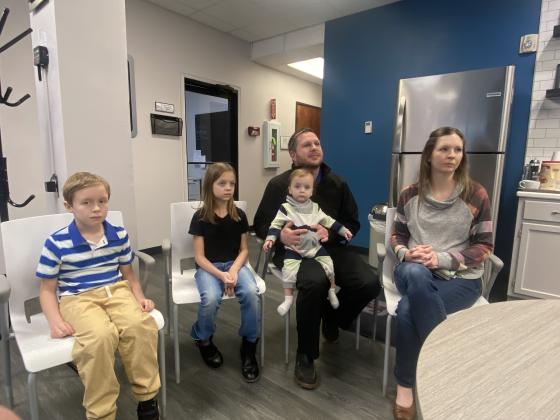Family’s experience shows importance of donating blood
LAWTON — Without donated blood, Theodore Poudrier might not have lived to see his first birthday.
Theodore was born Jan. 29, 2022, at Comanche County Memorial Hospital in Lawton. He was suffering from meconium aspiration syndrome, so his lungs were not working properly.
Meconium aspiration syndrome occurs when a newborn child breathes in a mixture of meconium – his or her first stool – and amniotic fluid, according to hopkinsmedicine.org, the website for John Hopkins Medicine in Baltimore. The condition occurs in about 5% to 10% of births and is a leading cause of severe illness and death in newborns.
Shortly after Theodore was born, he was airlifted to OU Children’s Hospital in Oklahoma City for treatment with an extracorporeal membrane oxygenation machine, an artificial heart and lung device which supplies blood to the patient’s body.
“They basically created a little port in his neck (for the machine),” his father, Lawton resident Jason Poudrier, said in a Jan. 31 interview at the Oklahoma Blood Institute office in Lawton. “And so, we got a call at about 2 or 3 in the morning a couple of days after he was born that we was going to have to have that surgery. We had to sign paperwork that he might need blood, so we had to sign off on that.”
Jason’s wife, Chelsey, said a doctor told the family that the machine needed extra blood to work, so it was possible that Theodore might not have survived without donated blood.
The Poudriers later learned the surgery was successful and a donor had provided the blood Theodore needed.
Theodore stayed in the hospital for about a month before returning home. His experience did not cause any permanent damage, except for a small scars on his neck where the tubes from the ECMO machine were inserted.
Easing the shortage
The Poudriers’ story illustrates the importance of giving blood, said Christi Chambers, executive director of OBI in southwest Oklahoma.
“Whenever you donate blood, you are affecting more than just that one person who is receiving the blood,” she said. “You are affecting their whole entire family.”
Chambers said the OBI is facing an emergency blood shortage, due to the wintry weather that gripped the state last week. She said the cold weather prevented many donors from giving blood, and some places that normally host blood drives were closed due to the weather.
However, the OBI office in Lawton remained open, and some places hosted pop-up blood drives to help ease the shortage.
Chambers urged people to consider donating blood now, before Oklahoma experiences another cold spell.
“Right now, we’re in what we call a blood emergency or blood appeal,” she said. “We’re just asking everyone who can donate, please come out and donate.”
Potential donors must meet OBI’s minimum age and weight requirements. Donors who are 16 must weigh at least 125 pounds and have signed parental permission, and 17-year-olds must weight at least 125 pounds. Donors 18 and older must weight at least 110 pounds.
The OBI does not require appointments, but scheduling a donation reserves a time slot and helps staff manage donors’ time efficiently.
Giving blood
Theodore Poudrier’s experience prompted his parents to start thinking about donating their own blood.
Jason Poudrier said he had given blood before, but he did not know anyone who had benefited from a donation until Theodore was born.
“It really just kind of woke me up that it’s more than just like, ‘It’s good to give blood because it helps people,’” Jason said. “It’s like, ‘Oh, my gosh, it saves lives.’ And it saved his.”
Jason said he donated blood at OBI shortly after Theodore’s birth, and he is now a regular donor.
Chelsey Poudrier said she knew blood donations can help other people, but she had never considered becoming a donor before. She added that she is slightly squeamish, so the thought of giving blood was difficult for her.
But Theodore’s birth caused her to change her mind.
“Now, knowing how important it is, I would like to give blood,” Chelsey said. “I still haven’t, but it’s definitely something that I want to do now.”


